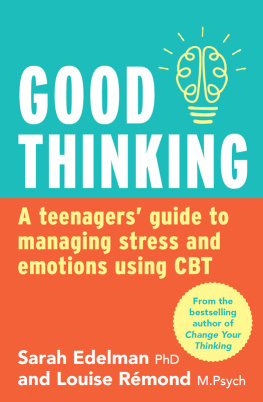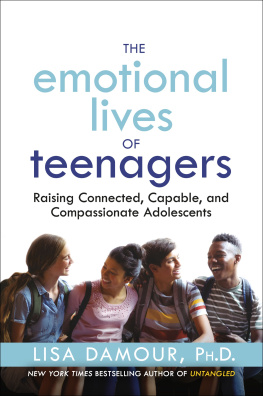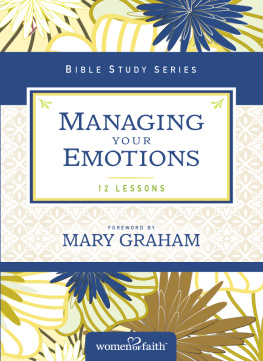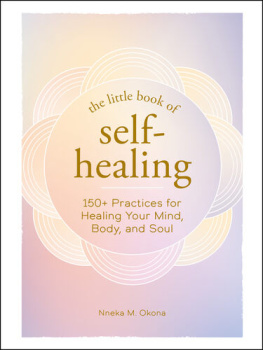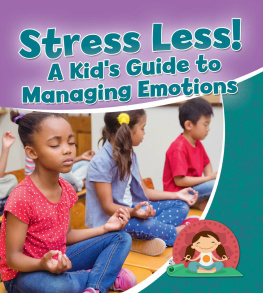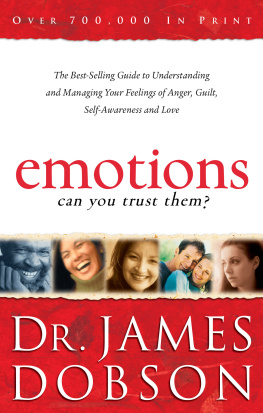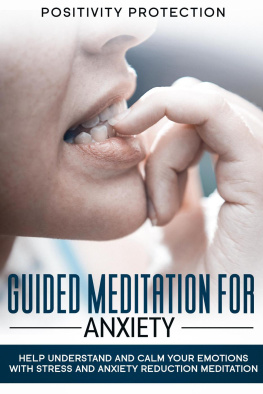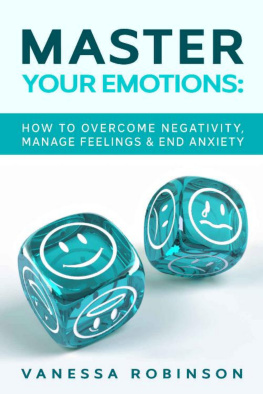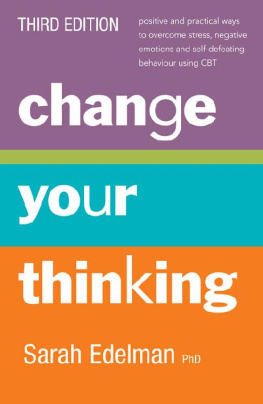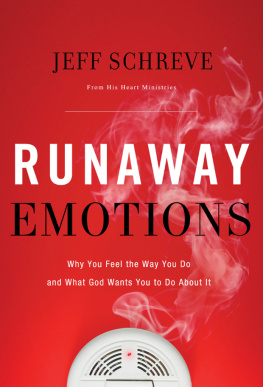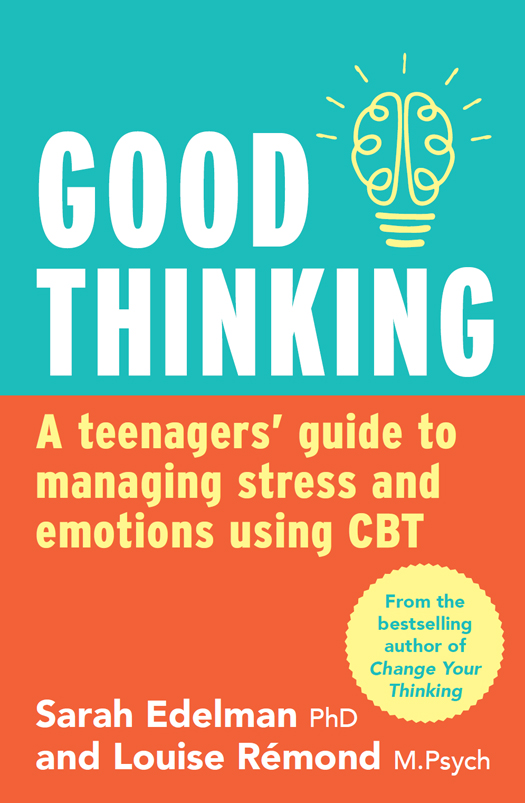Contents
Guide
This book is dedicated to all teenagers.
Happy reading and good thinking
Now and always.
SARAH EDELMAN is a clinical psychologist, author and trainer. She has published many articles in professional and mainstream journals, and is author of the best-selling book on CBT, Change Your Thinking.
LOUISE RMOND is a clinical psychologist at the Health Psychology Unit, University of Technology, Sydney. She conducts psychological therapy and workshops with teenagers and adults, and for many years wrote the Dolly Doctor Love and Life column for DOLLY magazine.
 | The ABC Wave device is a trademark of the Australian Broadcasting Corporation and is used under licence by HarperCollinsPublishers Australia. |
First published in Australia in 2017
by ABC Books for the Australian Broadcasting Corporation
by HarperCollinsPublishers Australia Pty Limited
ABN 36 009 913 517
www.harpercollins.com.au
Copyright Sarah Edelman and Louise Rmond 2017
Extracts from this book previously appeared in Taking Charge: A guide for teenagers (2004), by Sarah Edelman and Louise Rmond, published by the Foundation for Life Sciences (now known as the Antony Kidman Foundation).
The rights of Sarah Edelman and Louise Rmond to be identified as the authors of this work has been asserted by them in accordance with the Copyright Amendment (Moral Rights) Act 2000.
This work is copyright. Apart from any use as permitted under the Copyright Act 1968, no part may be reproduced, copied, scanned, stored in a retrieval system, recorded, or transmitted, in any form or by any means, without the prior written permission of the publisher.
HarperCollinsPublishers
Level 13, 201 Elizabeth Street, Sydney, NSW 2000, Australia
Unit D1, 63 Apollo Drive, Rosedale, Auckland 0632, New Zealand
A 53, Sector 57, Noida, UP, India
1 London Bridge Street, London SE1 9GF, United Kingdom
2 Bloor Street East, 20th floor, Toronto, Ontario M4W 1A8, Canada
195 Broadway, New York, NY 10007, USA
ISBN: 978 0 7333 3828 1 (paperback)
ISBN: 978 1 4607 0821 7 (ebook)
National Library of Australia Cataloguing-in-Publication data:
Edelman, Sarah, author.
Good thinking: a teenagers guide to managing stress and emotions using CBT / Sarah Edelman, Louise Rmond.
Notes: Includes index.
Subjects: Behaviour therapy teenagers.
Cognitive therapy teenagers.
Self-help techniques.
Cover design by Hazel Lam, HarperCollins Design Studio
Cover image by shutterstock.com
Theres a lot going on when youre a teenager. Pressure is mounting from different directions: parents and teachers are telling you to be more responsible, friends are introducing you to all sorts of new ideas, and the media is constantly bombarding you with messages about how you should look and act if you want to be popular and successful. On top of that, exams are on the horizon and decisions will need to be made about your future.
There are also many changes to which you need to adjust: your body developing, shifts in the nature of your relationships and even adjustments in the way you think about things. You might find yourself questioning who you are and where you fit in. If youre like many teens, you might feel as though youre in limbo youre definitely not a child any more, but youre not a fully fledged adult either. While the teenage years can be fun and exciting at times, they also bring many new challenges.
THE TEENAGE YEARS WHATS HAPPENING?
When youre a teenager you are developing in different ways, including physically, emotionally and socially.
PHYSICAL CHANGES
The most noticeable changes that occur during adolescence are the physical ones. As a teenager, you have a body that is growing and developing into an adult. These changes may be obvious to others, as well as to you.
Puberty kicks off when chemical messengers in the brain trigger the release of sex hormones. These produce changes in height, weight and body shape. Your skin becomes oilier (often bringing those annoying pimples). Periods and breasts start developing for girls, while erections and breaking voices start happening for boys.
These changes may lead to feelings of self-consciousness. Many teenagers worry about how they look and what others think of them. Not everyone develops at the same pace, and some experience more noticeable changes than others. Provided you are healthy, (mostly) eating well, getting enough sleep and exercising, then your body will be at a stage that is right for you.
BRAIN CHANGES
Scientists used to think that our brains were almost fully developed by early childhood. We now know, however, that our brains go through an important stage of rewiring from age twelve to our early twenties. As a result, many experts describe the teenage brain as being under construction. The brain goes through a process of pruning, where frequently used connections are strengthened. For example, if you are practising an instrument, doing particular maths problems a lot or gaming for hours on end, these pathways in your brain will get stronger. Connections that are no longer relevant or used very much (like a language spoken for only the first few years of your life) gradually disappear.
While these brain changes are occurring, the way you think and the choices you make will also change. In younger teenagers, the emotional part of the brain plays a greater role in problem-solving and decision-making, which is why you may sometimes do not-so-sensible things. You feel emotions more intensely, and may find yourself getting angry, anxious, sad or resentful more often than before. As you get older, other developments in your brain lead to changes in the way you think. For instance, you are better able to see other peoples point of view, reflect on your own thinking and consider the future.
Like any new development, these changes take some getting used to, and can sometimes send you into overdrive. For instance, many teens describe thinking about what ifs (that is, future possibilities and fears) and find themselves overthinking certain situations. You might find yourself thinking about deeper issues, such as love and spirituality, or becoming preoccupied with how others see you.
SOCIAL DEVELOPMENT AND A STRONGER SENSE OF IDENTITY
To move successfully from being a child to an adult, you need to become more independent. It is normal to want more freedom to do your own thing and make your own decisions. Your greater ability to think critically may cause you to challenge rules imposed on you by adults. This can be tough for parents and other adults who want to protect you, and may not think you are ready for the level of independence you are seeking. It can sometimes feel like a tug of war between you and them, which can lead to tensions and arguments on the home front.
The teenadult struggle that often occurs is normal during adolescence. It is part of the transition from total dependence on your parents and family in childhood, to independence as an adult. Most teenagers want to separate from their parents, and move towards friends and peers as their inner circle with whom they can bounce ideas off and hang out. This transition takes some adjusting to not just for you, but for others in your life as well.
Another part of adolescence is developing a stronger sense of your own identity. During the teenage years, it is normal to be asking yourself questions like: Who am I? and Where do I fit in? When you were younger, your identity was shaped by your family and early experiences. As a teenager, with your new thinking and all the other changes you are going through, this sense of identity is something you are beginning to explore more for yourself. This can be exciting, daunting and confusing all at the same time.
Next page
